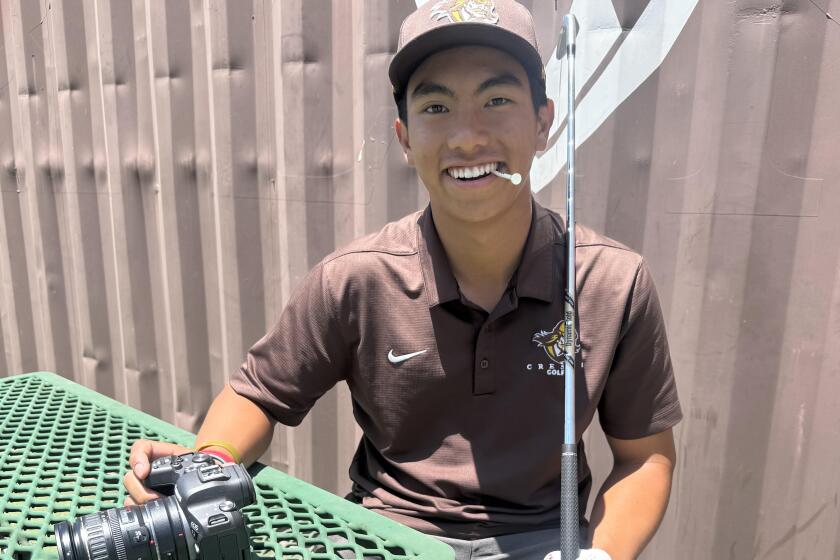Impact Players
- Share via
“This is a thrill to me,” says Lionel Gentry, blinking, the pads tight on his shoulders, sweat trickling down his face, the sounds of a football practice whistling around him. “I get to meet new people and it makes my football skills a lot better. This is a cool experience.”
It’s bright outside, a ripe July morning, and more than 150 kids are flanked on the USC football practice field. They have been brought to the campus to learn about life, about its opportunities and risks, about dealing with the problems and pressures of the inner city, and, most important, about how the decisions they make today will start to plant the seeds for their tomorrows.
Gentry, a senior running back from Westchester High, has dreams of playing big-time football. Most of these kids do. That’s why Jerry Horowitz, former high school coach and current national coordinator of Junior Player Development for the NFL, has helped to bring the five-day High School Player Development Program to L.A. for the first time.
The program, which was started in New York City two years ago, has several goals: Bring at-risk freshmen, sophomores and juniors from different city high schools onto one team, into one circle, educate them about college, about the importance of classwork and about the real world.
Speakers share life stories, all in the hopes of giving the kids something to think about when they go back home. Something to help them realize their dreams, and help them stay out of trouble and away from the lure of the streets.
Supervising the team are 19 coaches from around the Los Angeles area, among them Compton College Coach Cornell Ward, who, along with Horowitz, encouraged the kids to attend the camp.
“These kids are bright-eyed, bushy-tailed and they have great looks on their faces,” Horowitz said. “They smile a lot and they’re just great kids to be around.”
Horowitz was the coach at John F. Kennedy High in New York for 20 years and he said that his first and foremost passion was making an impact on his players’ lives, no matter their ability.
“I haven’t taught many kids that’ve become big-time football players,” he said. “But I’ve taught a lot of kids that went on to become successful in life. Good people and good parents. I just tried to have a little impact on them.”
During the five-day camp, players have lessons in life skills in the mornings and practice in the afternoon.
On Thursday, the main speaker was one of Horowitz’s former players, one-time Hofstra quarterback Rhory Moss.
Moss, who grew up on the drug-infested streets of Detroit and lost his father to AIDS when he was young, works for Bristol Myers-Squibb selling HIV-fighting drugs, and gives lectures about the disease.
He went through some of the same hardships that many of these players could relate to. He spoke to them candidly in a lecture about the consequences of unprotected sex, and the risks of HIV in their communities.
“The only way you can really reach people is to share some similar experience with them, especially at this age,” Moss said. “I grew up in a single-family home, with my mother and sisters. My dad died of AIDS. I could’ve said, ‘Oh, woe is me.’ I could’ve embellished that. But my attitude had more to do with dealing with the adversity and overcoming it. Helping them recognize that you can still be successful if you’re not a professional athlete. You can still go to college.
“Most of these kids don’t have vision at this point. They can’t see two or three years down the road. They’re thinking about next week, or tonight.”
He said he agreed to speak at the camp partly because of Horowitz.
“Coach Horowitz has made the most significant impact on my life, other than my mom,” Moss said. “We still keep in touch about a great many things. He was talking to me about this opportunity to talk to these kids about college and life. Something to take them off the streets for a while. I think a lot of kids here really got something out of this camp.”
Some show great potential and good work ethic. They catch passes, dive, sprint, leave heavy cleat marks in the grass.
Some have dreams of playing, but probably won’t.
The camp takes both kinds.
“A lot of this is about self-control and responsibility,” said David Poindexter, the NFL Youth Program’s assistant director. “This shows them that there is light at the end of the tunnel. We speak about resume writing and about how to prepare for the PSAT and SAT. How to ask questions of a guidance counselor. You know, a lot of these kids haven’t even thought about college.”
During the practices, the players are soaked. Some of them gawk, taking in the sights, not really focused on the game. Others, like Long Beach Jordan linebacker Devon Lee, are determined to make the most of the camp.
“This is pretty inspiring,” Lee said. “These aren’t words that I’ve never heard before, but hearing them from these guys motivates me to be a better person. To try hard in school, so I can make it and succeed, because not many people here will succeed. My main goal in life is to be a man, and succeed more than my father did.”
More to Read
Get our high school sports newsletter
Prep Rally is devoted to the SoCal high school sports experience, bringing you scores, stories and a behind-the-scenes look at what makes prep sports so popular.
You may occasionally receive promotional content from the Los Angeles Times.






